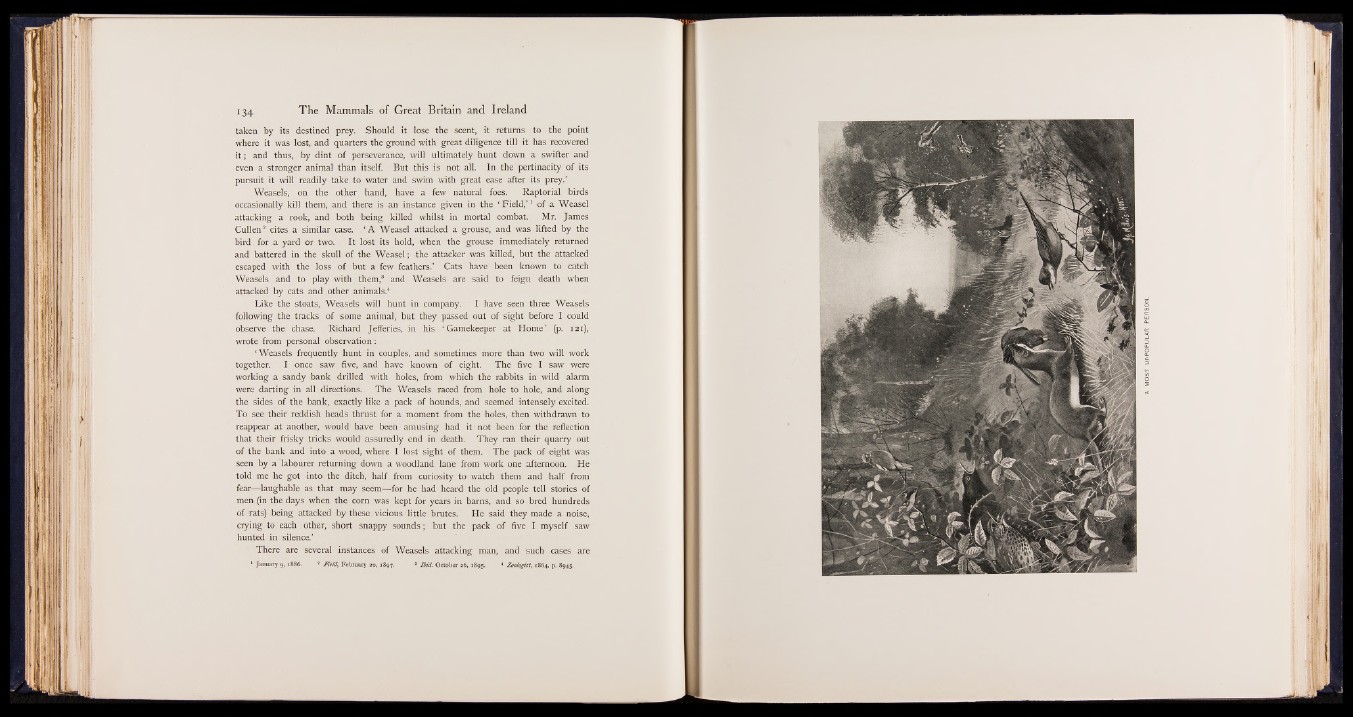
taken by its destined prey. Should it lose the scent, it returns to the point
where it was lost, and quarters the ground with great diligence till it has recovered
i t ; and thus, by dint of perseverance, will ultimately hunt down a swifter and
even a strongèr animal than itself. But this is not all. In the pertinacity of its
pursuit it will readily take to water and swim with great ease after its prey.’
Weasels, on the other hand, have a few natural foes. Raptorial birds
occasionally kill them, and there is an instance given in the ‘ Field,’ 1 of a Weasel
attacking a rook, and both being killed whilst in mortal combat. Mr. James
Cullen2 cites a similar case. ‘ A Weasel attacked a grouse, and was lifted by the
bird for a yard or two. It lost its hold, when the grouse immediately returned
and battered in the skull of the Weasel; the attacker was killed, but the attacked
escaped with the loss of but a few feathers.’ Cats have been known to catch
Weasels and to play with them,8 and Weasels are said to feign death when
attacked by cats and other animals.4
Like the stoats, Weasels will hunt in company. I have seen three Weasels
following the tracks of some animal, but they passed out of sight before I could
observe the chase. Richard Jefferies, in his ‘ Gamekeeper at Home’ (p. 121),
wrote from personal observation:
‘Weasels frequently hunt in couples, and sometimes more than two will work
together. I once saw five, and have known of eight. The five I saw were
working a sandy bank drilled with holes, from which the rabbits in wild alarm
were darting in all directions. The Weasels raced from hole to hole, and along
the sides of the bank, exactly like a pack of hounds, and seemed intensely excited.
To see their reddish heads thrust for a moment from the holes, then withdrawn to
reappear at another, would have been amusing had it not been for the reflection
that their frisky tricks would assuredly end in death. They ran their quarry out
of the bank and into a wood, where I lost sight of them. The pack of eight was
seen by a labourer returning down a woodland lane from work one afternoon. He
told me he got into the ditch, half from curiosity to watch them and half from
fear—laughable as that may seem—for he had heard the old people tell stories of
men.(in the days when the corn was kept for years in barns, and so bred hundreds
of rats) being attacked by these vicious little brutes. He said they made a noise,
crying to each other, short snappy sounds; but the pack of five I myself saw
hunted in silence.’
There are several instances of Weasels attacking man, and such cases are
1 January 9, 1886. * Field’ February 20, 1897. 8 Ibid. October 26, 1895. 4 Zoologist, 1864, p. 8945.